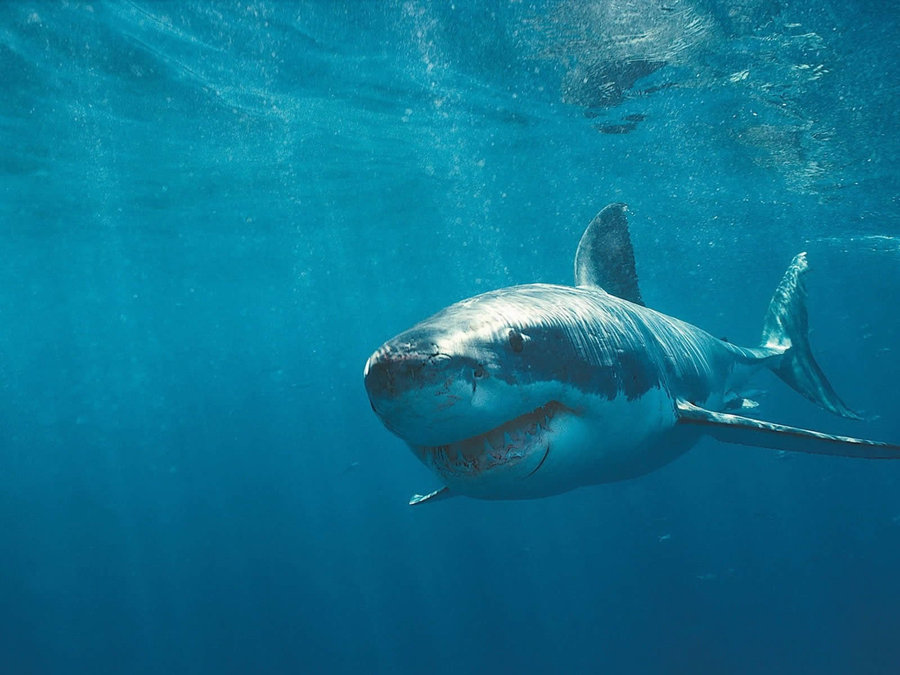(单词翻译:单击)
听力文本
This is Scientific American — 60-Second Science. I'm Christopher Intagliata.
Living at the top of the food chain, sharks can accumulate dangerous levels of methylmercury. So much that pregnant women and children are advised not to eat shark at all. But sharks can accumulate another toxin too, called BMAA, which has been linked to the development of neurodegenerative disease. Which could be bad news for shark eaters.
"Mercury in combination with BMAA is a one-two punch." Deborah Mash, a professor of neurology at the University of Miami's Miller School of Medicine. "These are two synergistic toxins. So even if there are low levels of exposure from the mercury or the BMAA, when humans are exposed to both of these toxins, then they will have a synergistic effect on the nervous system."
BMAA starts out in cyanobacteria, and travels up the food chain through crabs and shrimp and fish. And, as previous studies have shown, makes all the way to sharks. What Mash and her colleagues wanted to know was how widespread the problem was, and if the chemical often appeared alongside mercury. So they analyzed fin and muscle samples from 10 species of shark—55 individuals in all—from the Atlantic and Pacific Oceans. And they found BMAA and mercury in all 10 species. Suggesting that exposure to that "one-two punch" could be pretty common. The results are in the journal Toxins.

It's still not clear at this point what sort of risk this occasional exposure through food might have. Still, Mash isn't waiting.
"I myself would not want to be exposed to BMAA or methyl mercury in my diet by eating shark fin or shark meat or taking shark cartilage products. We already know that mercury is toxic to our health. And we already know that BMAA plus mercury is a very bad mix for the brain. So people need to be concerned, and I think that's not only for the benefit of us as consumers, but also to the poor sharks, who are threatened with extinction."
Conservationists have argued for years that sharks should be spared. Maybe now that it's us who are threatened... people might finally start to leave them alone.
Thanks for listening for Scientific American — 60-Second Science Science. I'm Christopher Intagliata.
参考译文
这里是科学美国人——60秒科学。我是克里斯托弗·因塔利亚塔。
因为生活在食物链的顶端,所以鲨鱼可以积累达到危险水平的汞。因为鲨鱼体内的汞含量非常高,所以建议孕妇和儿童不要吃鲨鱼。但是,鲨鱼还能积累另外一种毒素——BMAA,这种毒素与神经退行性疾病的发展有关。这对爱吃鲨鱼的人来说可是个坏消息。
“汞和BMAA的结合可谓是双重重击。”黛博拉·马许是迈阿密大学米勒医学院的神经学教授。“这是两种协同作用的毒素。即使汞或者BMAA的含量很低,但是只要人类接触到这两种毒素,它们就会对人的神经系统产生协同效应。”
BMAA最初存在于蓝藻中,之后通过螃蟹、虾类和鱼类进入食物链上层。此前的研究已经表明,BMAA最后进入鲨鱼体内。马许和她的同事们想知道,如果这种化学物质经常和汞一起出现,那这个问题的普遍性有多大。所以,他们从太平洋和大西洋的55只鲨鱼中提取分析了10种鲨鱼的鳍和肌肉样本。在这10种鲨鱼中,均发现了BMAA和汞。这表明,这两种毒素的结合非常普遍。该研究结果发表在《毒素》杂志上。
目前尚不清楚通过食物接触这些毒素会产生何种风险。但是马许并没有坐等结果。
“我不想因为吃鱼翅、鲨鱼肉或服用鲨鱼软骨制品而在饮食中接触到BMAA或甲基汞。我们已经知道汞危害我们的健康。我们也知道BMAA和汞结合会对我们的大脑造成更严重的危害。所以,我认为人们担心的不应该仅仅是我们作为消费者的利益,同时也要担心濒临灭绝的可怜的鲨鱼。”
多年来,环保人士一直认为应该保护鲨鱼。也许现在受到威胁的是我们人类……所以,现在人们可能不会再去管它们了。
谢谢大家收听科学美国人——60秒科学。我是克里斯托弗·因塔利亚塔。
译文为可可英语翻译,未经授权请勿转载!
重点讲解
重点讲解:
1. even if 即使;尽管;纵然;
例句:They'll stand by you even if you don't succeed.
即使你不成功他们也会支持你。
2. be exposed to 使暴露于(险境);使遭受(危险或不快);
例句:Women who are exposed to mercury, cadmium, or vinyl chloride before conceiving seem to be especially likely to have autistic kids.
女性在怀孕期间接触汞、镉或氯乙烯很有可能会生出自闭症患儿。
3. start out 起初是…;
例句:He started out to fix the car himself, but in the end, he had to ask for help.
起初他本打算自己修车,可最后他还是不得不请人帮忙。
4. leave alone 听…自便;随…去;不打扰;
例句:Some people need to confront a traumatic past; others find it better to leave it alone.
有人需要直面过去的创伤,有人则觉得不去想它为妙。


